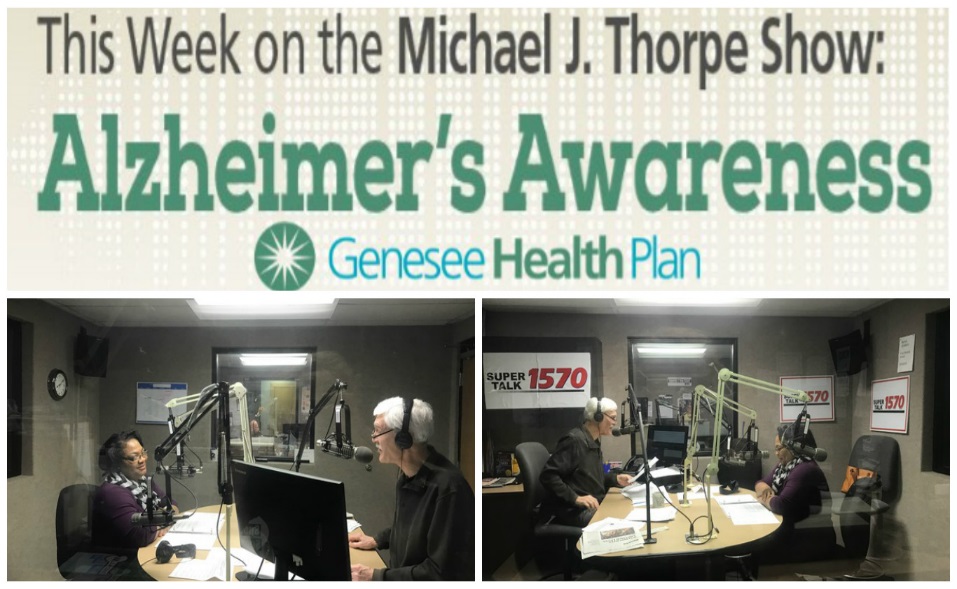March 8, 2017
As our loved ones age, it’s easy to become concerned about memory loss. If they forget the day of the week or where they placed their car keys, we often begin wondering if these are the early signs of Alzheimer’s disease.
Alzheimer’s disease is a type of dementia that commonly affects people over the age of 65 and impacts their memory, behavior and thinking. It is a progressive disease where symptoms gradually worsen over time. Alzheimer’s disease is the sixth leading cause of death in the United States and more than five million Americans are living with the disease, according to research by the Alzheimer’s Association.
There are three known types of Alzheimer’s disease: Early-onset Alzheimer’s, late-onset Alzheimer’s and Familial Alzheimer’s disease (FAD). Late-onset is the most common form of Alzheimer’s disease with approximately 90 percent of cases usually occurring after age 65. Early-onset Alzheimer’s, which occurs in less than 10 percent of Alzheimer’s cases, affects people younger than age 65. The rarest form of Alzheimer’s, which is FAD, can affect people in their 40s, occurs in less than one percent of Alzheimer’s cases and is entirely inherited.
Unfortunately, there is currently no cure for Alzheimer’s, but there are preventative steps individuals can take to slow down the disease. Keep reading to learn about the warning signs and symptoms of Alzheimer’s, and what you can do if you, a friend or relative is diagnosed with the disease.
The most common symptom associated with Alzheimer’s disease is memory loss, such as forgetting information like dates or events or having to constantly ask for the same information over and over. Some people may also have difficulty solving common problems, like balancing a checkbook or remembering how to complete a household chore. They may also have difficulty starting conversations or have issues with their vocabulary, such as trying to remember a specific word or calling things by the wrong name (e.g. calling the bathroom the kitchen).
There are also a number of uncommon symptoms that should not be ignored. For example, someone may forget the function of an object (e.g. such as where to put dirty dishes). Alzheimer’s patients also often tend to over eat or under eat, so it’s important to pay attention to changes in their diet. Other warning signs include withdrawing from social activities, giving up hobbies, making poor decisions, showing changes in personal hygiene or appearance, or experiencing changes in personality.
People who begin showing signs of Alzheimer’s may only show one or two signs at first; however, the moment you notice signs in yourself or a loved one, schedule a doctor’s appointment immediately. The sooner Alzheimer’s is diagnosed, the easier it will be to reduce the intensity of symptoms, receive treatment and maintain independence for a longer period of time.
If your primary care physician thinks you or your loved one may have Alzheimer’s, they may recommend seeing a specialist such as a neurologist, psychiatrist, psychologist or a geriatrician, a doctor who specializes in the care of older adults. Although the symptoms of Alzheimer’s cannot be stopped, these doctors can help identify proper treatment and develop a plan for the future as the disease progresses.
Like many diseases, there are steps you can take to reduce the risk of getting Alzheimer’s. Eating healthy foods including fruits, vegetables and foods that are rich in omega-3 fatty acids can help reduce the risk of getting Alzheimer’s. There is also strong evidence that living a healthy lifestyle and creating a habit of lifelong learning may reduce the risk of Alzheimer’s. Additionally, reducing risks of other diseases associated with Alzheimer’s, such as diabetes and cardiovascular disease, can also help prevent Alzheimer’s.
Although Alzheimer’s is a devastating disease that is an emotional journey for patients and their families, there are resources available that can help. Many local healthcare organizations, such as the Alzheimer’s Association of Flint, Valley Area Agency on Aging and the Genesee County Commission on Aging, provide resources and tools for caregivers and families who are caring for a person with Alzheimer’s. These organizations can also connect you to support groups, counseling services and various health care programs that can help both patients and families cope with the disease. There is also an Alzheimer’s Association Hotline available 24/7, call 1.800.272.3900.
Genesee Health Plan (GHP) facilitates outreach to the community in many ways to address an array of health-related topics and concerns, including raising awareness of Alzheimer’s disease. Currently, GHP has a relationships with Cumulus Broadcasting allowing us to share information on several health-related topics during the Michael J. Thorpe Supertalk 1570 morning show. GHP Director of Outreach, E. Yvonne Lewis, was in studio on March 7, 2017 speaking to the topic of Alzheimer’s disease in the pictures shown below. Audio of each interview is available at the GHP website, geneseehealthplan.org under “What’s New at GHP.” Listen to this week’s interview here.

For more information about Alzheimer’s disease, visit alz.org. You can also find local community resources on our website at geneseehealthplan.org/community-resources.
For our tenth year in a row, we are hosting a “Health Heritage Essay Contest” for young people learning the ... READ MORE
On Thursday, October 24th, GHP Enrollment Team Coordinator, Jill Alexander, and Director of the Michigan Medicare Assistance Program, Uratile Sijiye, ... READ MORE
*Photos available at the end of the release and here. FOR IMMEDIATE RELEASE: Monday, August 5, 2024 Shannon Ciszek, Communications Coordinator Genesee ... READ MORE
FOR IMMEDIATE RELEASE: Tuesday, December 5, 2023 CONTACT: Jada Fisher 517-281-0944 LEO awards over $1.5 Million to Genesee Health Plan to expand ... READ MORE